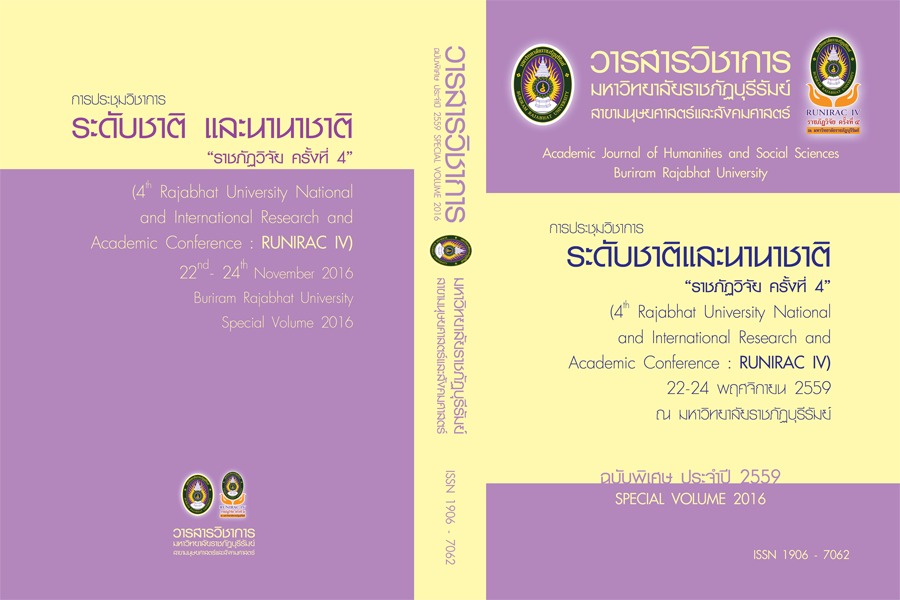Professional Development of Mathematics teacher through Lesson Study in Savannakhet Teacher Training College
Main Article Content
บทคัดย่อ
การพัฒนาวิชาชีพต่อเนื่อง (CPD) ของโปรแกรมการฝึกอบรมครูผู้สอนในประเทศลาวเป็น
หนึ่งในเป้าหมายของรัฐบาลในการปรับปรุงคุณภาพการเรียนการสอนในชั้นเรียนและประสิทธิภาพ
ของนักเรียน ดังนั้นครูผู้สอนที่มีประสิทธิภาพจะช่วยเสริมสร้างการพัฒนาวิชาชีพในทางปฏิบัติที่เกิด
ขึ้นจริงในชั้นเรียน วิจัยนี้นำ เสนอกรณีศึกษาของครูคณิตศาสตร์ในวิทยาลัยครูสะหวันนะเขต(STTC)
ในประเทศลาวที่ทำ งานในทีมวิจัยบทเรียนซึ่งเตรียมความพร้อมในการปรับปรุงการสอนและการเรียน
วิชาคณิตศาสตร์ กระบวนการวิจัยบทเรียนประกอบด้วยการเตรียมความพร้อม การสังเกตการณ์และ
การสะท้อนให้เห็นการเรียนการสอนในชั้นเรียนวิชาคณิตศาสตร์ ข้อมูลแสดงให้เห็นอย่างชัดเจนว่า
สภาพแวดล้อมการทำ งานร่วมกันตลอดการวิจัยบทเรียนเอื้อให้ครูเพิ่มองค์ความรู้ด้านเนื้อหาและองค์
ความรู้ด้านวิธีการสอนในการสอนคณิตศาสตร์นอกจากนี้ผลการเรียนรู้ของนักเรียนยังมีการพัฒนาขึ้น
ด้วยกระบวนการวิจัยบทเรียนอีกด้วย
Article Details
- ต้นฉบับที่ได้รับการตีพิมพ์ในวารสารวิชาการ มหาวิทยาลัยราชภัฏบุรีรัมย์ สาขามนุษยศาสตร์และสังคมศาสตร์ ถือเป็นกรรมสิทธิ์ของมหาวิทยาลัยราชภัฏบุรีรัมย์ ห้ามนำข้อความทั้งหมดหรือบางส่วนไปพิมพ์ซ้ำเว้นเสียแต่ว่าจะได้รับอนุญาตจากมหาวิทยาลัยฯ เป็นลายลักษณ์อักษร
- เนื้อหาต้นฉบับที่ปรากฏในวารสารเป็นความรับผิดชอบของผู้เขียน ทั้งนี้ไม่รวมความผิดพลาด อันเกิดจากเทคนิคการพิมพ์
เอกสารอ้างอิง
we know and what we need to learn. Phi Delta Kappan, 77(7), 500-508.
Ball, D.L., & Cohen, D.K. (1999). Developing practice, developing practitioners :Toward
a practice-based theory of professional education. In G. Sykes & L. Darling-
Hammond (Eds.), Teaching as the learning profession: Handbook of policy
and practice (pp. 3-32). San Francisco: Jossey-Bass.
Cheung, W. M. & Wong, W. Y. (2014). Does lesson study work? A systematic review
on the effectsof lesson study and learning studyon teachers and students.
InternationalJournal for Lesson and Learning Studies, 3(2), 137-149.
Fernandez, C. (2002).LearningfromJapaneseapproachesto professional development :
The case of lesson study. Journal of Teacher Education, 53(5), 390-405.
Fernandez, C., Cannon, J., & Chokshi,S. (2003). A U.S.-Japanlessonstudycollaboration
revealscritical lenses forexamining practice.Teachingand TeacherEducation,
19(2), 171-185
Fernandez, C., & Yoshida, M. (2004). Lesson Study: A case of a Japanese approach
toimprovinginstructionthroughschool-based teacher development. Mahwah,
NJ: Lawrence Erlbaum.
Lewis, C. (2002). Lesson Study: A handbook of teacher-led instructional change.
Philadelphia, PA: Research for Better Schools.
Lewis, C.,Perry,R., & Murata, A. (2006). How should researchcontributetoinstructional
improvement?Thecaseof lessonstudy. EducationalResearcher,35(3), 3-14.
Ministry of Education and UNESCO (2005), Education for All, National Plan of Action,
Vientiane.
Ministry of Education and Sport (2010), Teacher Education Action Plan TESAP-II
(2011-2015), Vientiane.
Ministry of Education and Sport (2015), Teacher Education Action Plan TESAP-III
(2016-2020), Vientiane. Note on the Poverty Reduction Strategy Paper
NationalSocio-Economic DevelopmentPlan(2006-2010)and AnnualProgress
Report. Washington, DC : The World Bank.
Puchner, L. D. & Taylor, A. R. (2006). Lesson study, collaboration and teacher
efficacy: Stories from twoschool-based math lesson study groups. Teaching
and Teacher Education,22(7), 922-934.
Saito, E. & Atencio, M. (2013). A conceptual discussion of lesson study from a micro
political perspective: Implications for teacher developmentand pupil learning.
Teachingand Teacher Education, 31, 87-95.
Saito, N. (2007). Lesson study in Laos. JAPANESE LESSON STUDY IN MATHEMATICS
Its Impact, Diversity and Potential for Educational Improvement.
Sythong,P. (2013) Studyonimproving theclass teaching practices power for students
of Teacher Training College: Developing analytical approach. International
Journal of researcher on Mathematics and Science.


